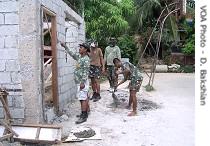2007年VOA标准英语-Controversy Flares Over Military Presence in Ma(在线收听)
Manila
28 March 2007
Leftist parties in the Philippines say their members are being harassed by troops sent to poor sections of Manila. The military says the soldiers are there to help with public works projects and assist the police. Douglas Bakshian reports from Manila on a program that is bringing back some troubling memories as the country prepares for congressional elections in May.
 |
| Philippine soldiers constructing a day care center in Manila |
That kind of activity is nothing new in areas where the military is bogged down in conflict, such as the four-decade-long war with Muslim separatists in the south. But this latest program is taking place among the urban poor of the capital, Manila. The military's competitors in the battle for ideas - left-wing political parties - are upset at what they call an intrusion.
The operation in Manila, which began in September, involves 26 teams of 10 members each. Major General Benjamin Dolorfino, commander of the armed forces in the capital, says the program is standard operating procedure.
"It is the civil-military operations program of the Armed Forces. And this has been a continuing program because all the armed forces has both the right hand and left hand approach," he said. "The right hand approach utilizes military force. And the left hand, these are military operations other than war, otherwise known as civil military operations."
Leftist groups, such as Bayan Muna and its allies, tell a different story. They say the troops harass party workers and put them under surveillance. They also accuse troops of giving propaganda lectures describing legal leftist groups as people to be regarded with suspicion.
Dolorfino admits as much.
The military links even legal leftist groups with its old enemy, the Communist Party of the Philippines, and says it believes the communists are trying to regain a foothold in the capital. The guerrillas normally operate in rural areas, but in the late 1980s they sent assassination squads to Manila.
"Public information, making the people aware of good ideas - be responsible citizens, and of course to counter bad ideas, like the ideas propagated by the communist-terrorist movement," he said.
There is a powerful historic element at play here. The Philippines was under martial law for 14 years, until the People Power revolution of 1986 deposed President Ferdinand Marcos and brought back democratic government. It is a gain cherished by many Filipinos.
Recently, the military has been accused by local and international human rights organizations of conducting an assassination campaign against leftists.
Ramon Casiple heads Manila's Institute on Political and Electoral Reforms. He says that whatever the soldiers are doing, their deployment in sections of the capital prior to a national election looks too much like the Marcos days.
"Definitely you're talking repression," he said. "The tendency there, of course, is that they are using practices that have been going on during the Marcos days. Marcos was fond of doing that also. It smacks of a militarization of society."
Opinion polls show that Bayan Muna and similar groups are making a strong showing in urban areas, and the leftists say they are being targeted because of their political strength ahead of congressional elections set for May.
Bayan Muna congressman, Teodoro Casino, calls the creeping military influence a dangerous trend.
"The anti-poverty program, the development program, has now been meshed with the counter-insurgency program, and that is what they say is the holistic approach," he said. " And it is basically the militarization of government. So it's practically martial law."
Critics of the military presence in Manila note that there are many civilian agencies capable of providing public services and anti-poverty programs.
Maria Teresa Bautist, mother of six, in Payatas district of Manila
Manila's Payatas district is one area where Bayan Muna says leftists have been harassed. When reporters visited the district recently, soldiers were constructing day care centers. Maria Teresa Bautista, 43, who has six children, was positive about the military's presence.
"That is for the children, we call that a day care center, for the kids four years to six years," she said.
BAKSHIAN: "Is the military helping?"
"Good. That is Help. No asking money. They did not ask me about the election," she replied.
Bautista says many politicians have been to her neighborhood and made promises, but these are not kept.
She expects nothing to change with the elections.
"That is the same old story," she said. "Always promise, promise, promise…Promise made…broken."
BAKSHIAN: "What do the elections mean to you?"
"You choose the good one, but until now I don't know if there is a good one," she said.
BAKSHIAN: "So you're not expecting much from the election?"
"Nothing," she replied.
Philippines soldiers doing cement work on a day care center in Manila
Complaints about the military have been made to the Philippine Elections Commission. Its chairman, Benjamin Abalos, says the charges have not yet been adequately documented, but he says he is watching the situation.
"If, as I said, in any way it will cause intimidation and somehow affect the political rights or, in a way, thwart the political outcome there, the real political outcome, I assure you, I'll see to it that these people, I mean these military, should have to be back to the barracks and leave the area," he said.
The Election Commission has already officially isolated the military from the electoral process. Troops are no longer allowed to transport ballot boxes or ballots, since a 2004 election scandal in which several generals were accused of meddling with the vote count to help President Gloria Arroyo win the race.